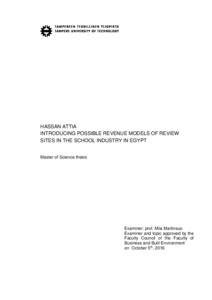Introducing Possible Revenue Models of Review Sites in the School Industry in Egypt
Attia, Hassan (2017)
Attia, Hassan
2017
Master's Degree Programme in Business and Technology
Talouden ja rakentamisen tiedekunta - Faculty of Business and Built Environment
This publication is copyrighted. You may download, display and print it for Your own personal use. Commercial use is prohibited.
Hyväksymispäivämäärä
2017-03-08
Julkaisun pysyvä osoite on
https://urn.fi/URN:NBN:fi:tty-201702081109
https://urn.fi/URN:NBN:fi:tty-201702081109
Tiivistelmä
Businesses use different marketing communication tools to promote their company, product or services. Alongside the traditional tools, new Internet-based tools e.g. social media networks and review sites, are emerging thanks to technological breakthroughs. Review sites such as TripAdvisor, Yelp and IMDb have enabled creating large source of information on the web i.e. user generated contents in the form of blogs, comments, reviews etc. Academically, these sites have attracted considerable attention to study their business models and implications; however, critical elements such as revenue models have been overlooked, particularly for school review sites.
The objective of this thesis is to introduce possible revenue models that school review sites can utilize to derive revenue and to discuss the key requirements of these models. The theory framework has been developed bringing together the concepts of marketing communication tools, word-of-mouth communication, review sites and revenue models. The empirical data have been collected through three methods: semi-structured interviews with key persons in school reviews sites, survey a sample of education stakeholders in Egypt and process benchmarking the best practices of review sites.
The research revealed that no platform relies on a single revenue model. Nevertheless, review sites agreed to utilize a mixed model that consists of a combination of revenue models in order to explore the value appropriation advantages of each model. The study suggests that commercial-driven school review sites can adopt advertising, transaction and subscription models. However, non-profit platforms can better adopt philanthropy or corporate sponsorship models to derive revenues.
The objective of this thesis is to introduce possible revenue models that school review sites can utilize to derive revenue and to discuss the key requirements of these models. The theory framework has been developed bringing together the concepts of marketing communication tools, word-of-mouth communication, review sites and revenue models. The empirical data have been collected through three methods: semi-structured interviews with key persons in school reviews sites, survey a sample of education stakeholders in Egypt and process benchmarking the best practices of review sites.
The research revealed that no platform relies on a single revenue model. Nevertheless, review sites agreed to utilize a mixed model that consists of a combination of revenue models in order to explore the value appropriation advantages of each model. The study suggests that commercial-driven school review sites can adopt advertising, transaction and subscription models. However, non-profit platforms can better adopt philanthropy or corporate sponsorship models to derive revenues.
